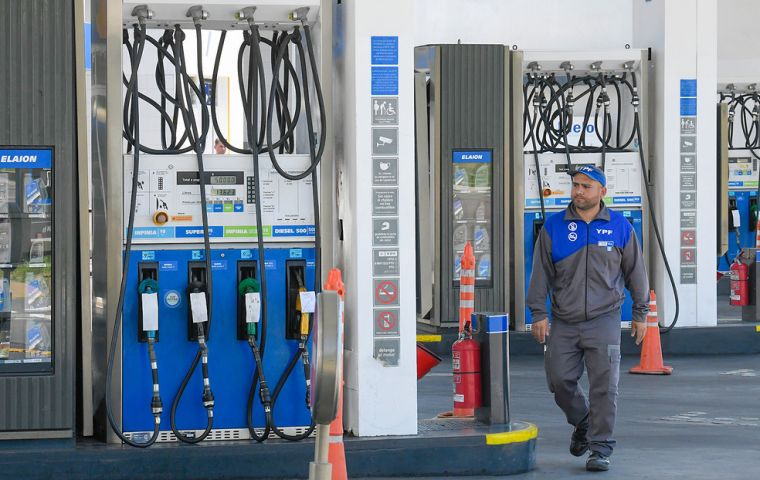MercoPress. South Atlantic News Agency
Argentina: Fuel at pumps soars as gov't lifts taxation cap
 Decree 107/2024 bears the signatures of President Milei and Ministers Luis ‘Toto’ Caputo (Economy) and Guillermo Francos (Interior)
Decree 107/2024 bears the signatures of President Milei and Ministers Luis ‘Toto’ Caputo (Economy) and Guillermo Francos (Interior) Drivers lined up for hours Wednesday in Buenos Aires and other places across Argentina as a new increase in the price of fuel at pumps was expected to be enacted Thursday following a decision by the administration of President Javier Milei to release a liquid fuel (ICL) and carbon dioxide (IDC) tax cap in force since 2021, it was reported.
The measure was published in the early hours of Thursday morning in Decree 107/2024 of the Official Gazette and bears the signatures of President Milei and Ministers Luis 'Toto' Caputo (Economy) and Guillermo Francos (Interior).
The Argentine Government thus foresees a gradual increase in the price of fuel together with larger collections to tackle fiscal deficit and State funding. The final retail price remains to be decided upon by the various oil companies taking into account the devaluation of the official exchange rate, the price of the Brent barrel, and the import parity price. Prices were expected to go up between 10 and 15% at least.
Fuel taxes have an update mechanism based on the variation of the Consumer Price Index (CPI) released monthly by the National Institute of Statistics and Census (Indec), it was also explained. Further adjustments to fuel retail prices are expected in the following months due to other factors, according to local media.
However, since Milei took office on Dec. 10 and implemented a series of measures to correct a distorted pricing scheme permanently hinging on government subsidies, “sales have fallen between 10 and 15%,” it was also reported. It did bring an end to across-the-border tanking-up missions by Paraguayan and Uruguayan drivers, which can also account for part of the drop in sales.




Top Comments
Disclaimer & comment rulesCommenting for this story is now closed.
If you have a Facebook account, become a fan and comment on our Facebook Page!